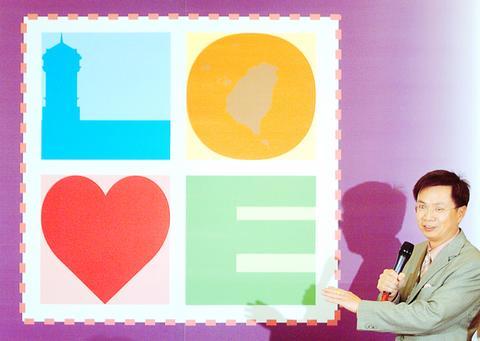The recent controversy over a graphic image that the Presidential Office chose as an emblem for President Chen Shui-bian's (
Last Wednesday, two days after the Presidential Office unveiled a logo that was to be used on identification badges during Chen's inauguration on May 20, a Chinese-language newspaper accused the logo's designer, Hao Kuang-tsai (郝廣才), of copying a well-known image by pop art guru Robert Indiana -- a work called LOVE, created in 1964. The paper gave the story front-page coverage and five sidebars.
Hao's design featured the word "love," with each letter occupying a square and with those four squares together forming a larger square. Hao designed a graphic element that went along with each letter: the Presidential Office for "l," the island of Taiwan for "o" and so forth. The Presidential Office called the emblem "Beloved Taiwan."

After accusations of plagiarism emerged, the Presidential Office quickly replaced Hao's emblem with another of Hao's designs, saying that the design originally chosen was only one of a number of possible designs and was not the final version because an important element -- the flag -- had been left out.
But on Thursday, another newspaper accused Hao of copying -- in this case a US stamp that was released in 2002.
The 2002 Love Stamp, which was designed by Michael Osborne Design Company, a noted branding design firm in San Francisco, features abstract geometric letters in bright playful colors, and very closely resembles Hao's design in layout and color.

In an interview with the Taipei Times, Hao denied that he had copied Indiana or Osborne's work, saying that squares are frequently used when making designs with words that contain four letters, and that similar designs can be found all over the Internet.
"My emblem was inspired by the tower of the Presidential Office building, which is similar to the pattern of the letter `l,'" Hao said, displaying many drafts to show his design was the product of his own originality.
"After adding the shape of Taiwan, it occurred to me to use `love' as the theme to highlight the presidential inauguration," he said.
Hao confirmed that he had seen Indiana's work, but said that he had never seen the US stamp.
Hao said that he created his designs over the course of one night, under great time pressure, and that it would have been impossible for him to refer to others' work in such a short time.
"Had I seen the American stamp, I would definitely have avoided using a similar design," Hao said.
Feeling that he is on a streak of bad luck in terms of being accused of copying others' work, Hao said that the stories in the China Times last Wednesday were full of malice toward him and the Presidential Office.
"I would have thought they would have found better ways to deal with this," Hao said.
"People who are malicious to others pay a heavy price," he said.
Hao, 43, editor at the Grimm Culture Publishing Company, which publishes children's books, is a frequent consultant on Democratic Progressive Party advertising and publications.
Pai Ya-ling (
"Creativity can be derived from prior ideas and training and the accumulation of knowledge -- and often, imitation is part of the process of learning how to make art," Pai said.
Pai also said that the Internet has made plagiarism easier than before, which means that artists and art students must be more careful about the issue of copying others' work.
"In an increasingly competitive marketplace, ignorance and laziness can overwhelm creators' integrity," Pai said.
"I think Hao is an artist and a creator and I don't think he had any intention of copying others' work," Pai said.
On the other hand, Pai, whom the newspaper that first covered the story called the whistleblower in the whole affair, told the Taipei Times that that the newspaper had misquoted her and fabricated words, which made her feel that the story was an example of manipulation.
"Even the picture of Indiana's work, which the paper indicated came courtesy of my art center, was not provided by me," Pai said.
"I just provided my understanding of Indiana's work. I never expected it would become a story that went so far beyond my original comments.
"I think the logo incident deserves constructive discussion and reflection and can shed light on Taiwan's competitiveness," Pai said.

An essay competition jointly organized by a local writing society and a publisher affiliated with the Chinese Communist Party (CCP) might have contravened the Act Governing Relations Between the People of the Taiwan Area and the Mainland Area (臺灣地區與大陸地區人民關係條例), the Mainland Affairs Council (MAC) said on Thursday. “In this case, the partner organization is clearly an agency under the CCP’s Fujian Provincial Committee,” MAC Deputy Minister and spokesperson Liang Wen-chieh (梁文傑) said at a news briefing in Taipei. “It also involves bringing Taiwanese students to China with all-expenses-paid arrangements to attend award ceremonies and camps,” Liang said. Those two “characteristics” are typically sufficient

A magnitude 5.9 earthquake that struck about 33km off the coast of Hualien City was the "main shock" in a series of quakes in the area, with aftershocks expected over the next three days, the Central Weather Administration (CWA) said yesterday. Prior to the magnitude 5.9 quake shaking most of Taiwan at 6:53pm yesterday, six other earthquakes stronger than a magnitude of 4, starting with a magnitude 5.5 quake at 6:09pm, occurred in the area. CWA Seismological Center Director Wu Chien-fu (吳健富) confirmed that the quakes were all part of the same series and that the magnitude 5.5 temblor was

The brilliant blue waters, thick foliage and bucolic atmosphere on this seemingly idyllic archipelago deep in the Pacific Ocean belie the key role it now plays in a titanic geopolitical struggle. Palau is again on the front line as China, and the US and its allies prepare their forces in an intensifying contest for control over the Asia-Pacific region. The democratic nation of just 17,000 people hosts US-controlled airstrips and soon-to-be-completed radar installations that the US military describes as “critical” to monitoring vast swathes of water and airspace. It is also a key piece of the second island chain, a string of

The Central Weather Administration has issued a heat alert for southeastern Taiwan, warning of temperatures as high as 36°C today, while alerting some coastal areas of strong winds later in the day. Kaohsiung’s Neimen District (內門) and Pingtung County’s Neipu Township (內埔) are under an orange heat alert, which warns of temperatures as high as 36°C for three consecutive days, the CWA said, citing southwest winds. The heat would also extend to Tainan’s Nansi (楠西) and Yujing (玉井) districts, as well as Pingtung’s Gaoshu (高樹), Yanpu (鹽埔) and Majia (瑪家) townships, it said, forecasting highs of up to 36°C in those areas